The Great Cyprus Think Tank
The Great Cyprus Think Tank is a lighthearted novel that pokes fun at imperialism and the exoticization of others.
In Larry Lockridge’s satirical novel The Great Cyprus Think Tank, frivolous academics undertake a mission to “save” the Mediterranean island of Cyprus.
Told through the eyes of think tank organizer and self-proclaimed midlist author Bart Beasley, the chapters are episodic. They cover how various members of an academic group set out to improve the lives of Cypriots on the island. According to the group, which includes a nutritionist, a neurologist, a meteorologist, a zoologist, and an archaeologist, the country is in shambles: Greek and Turkish Cypriots quarrel, animal species are becoming endangered, the island doesn’t get enough rain, and historically significant artifacts have been lost lost.
But the academics’ experiments are either in vain, lack scientific rationale, or both. For example, Gayle’s mission as a meteorologist is to induce rain on the island. By mixing “Morton table salt, Johnson & Johnson baby powder, and Armato dry ice” with hydrochlorothiazide, a diuretic, she makes the sky urinate (and the sobriquet “Gayle’s Golden Showers” also illustrates the book’s penchant for adult humor). After spreading her solution, she is stopped by the Turkish Air Force and put on trial for failing to inform the government of the project; she faces these challenges on her own, showing how little the think tank cares about its people. Then, the rainfall wreaks excess havoc on the island, causing more damage than good.
The satire extends beyond academia, permeating conversations around sociopolitical conflicts as well. When explaining how the neurologist’s “Empathomax” formula to make the Greek and Turkish Cypriots stop hating each other was authorized, Beasley writes that “the Food and Drug Administration quickly approved the ethics since only ethnics would be endangered,” implying that the US cares little about minority groups. The flippant tone, with the wordplay between “ethics” and “ethnics,” is also clear.
Over the course of the story, the fleshed-out cast members share their backstories and make romantic advances toward one another, giving insight into various aspects of who they are. Their conversations and voices are equally distinctive. Melusina, the archaeologist, speaks with a heavy, singsong accent that highlights her free spirit: “Unfair when the seeker of Aphrodite out of the loop is getting left!” she exclaims after seeing the woman she’s attracted to holding hands with a man in the group.
The sophisticated prose includes numerous references to religion, history, science, and languages. And the language itself honors the diversity of the human condition, employing esoteric words like “penitential,” “dervish,” and “duumvirate” and maintaining the source languages for many foods and articles of clothing. These words are not always understood from context, though: some interrupt the narrative flow. Further, due to the segmented progression of the story, the narrative becomes somewhat formulaic. Each character’s mission faces a version of the same twist, exposing the fact that Cyprus does not need the think tank.
A lighthearted novel that pokes fun at imperialism and the exoticization of others, The Great Cyprus Think Tank questions the utility of international interventions.
Reviewed by
George Hajjar
Disclosure: This article is not an endorsement, but a review. The publisher of this book provided free copies of the book and paid a small fee to have their book reviewed by a professional reviewer. Foreword Reviews and Clarion Reviews make no guarantee that the publisher will receive a positive review. Foreword Magazine, Inc. is disclosing this in accordance with the Federal Trade Commission’s 16 CFR, Part 255.

